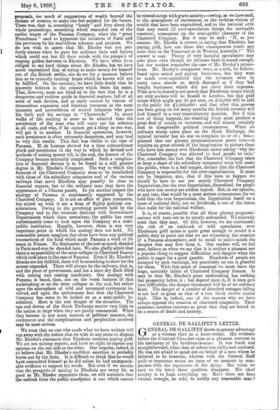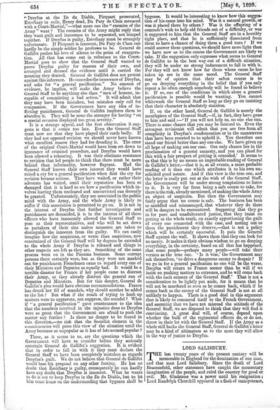GENERAL DE GALLIFET'S LETTER. G ENERAL DE GALLIFET shows to greater
advantage as a witness than as a letter-writer. His evidence before the Criminal Chamber came as a pleasant contrast to the testimony of his brethren-in-arms. It was frank and straightforward, when that of others was shifty and confused. He was not afraid to speak out on behalf of a man whom he believed to be innocent, whereas with the General Staff guilt or innocence seems an issue of no moment in com- parison with the reputation of the Army. Bui. when we turn to his letter these qualities disappear. His chief anxiety is to hush everything up. Have there not been victims enough, he asks, to satisfy any reasonable man ? "Dreyfus at the Ile du Diable, Picquart prosecuted, Esterhaq in exile, Henry dead, Du Paty de Clam menaced with a Court-Martial,"—what more can the " enemies of the Army" want ? The enemies of the Army might reply that they want guilt and innocence to be separated, not lumped together. If Dreyfus is guilty, Esterhazy must be strangely unfortunate. If Picquart is innocent, Du Paty de Clam can hardly be the simple soldier he professes to be. General de Gallifet pushes his love of silence to the point of exaggera- tion. All that has conic out in reference to the Court- Martial goes to show that the General Staff wanted to prove Dreyfus guilty for reasons of their own, and arranged and dressed the evidence until it carried the meaning they desired. General de Gallifet does not protest against this inference. He concedes the innocence of Dreyfus, and asks for "a general pacification." No amount of evidence, he implies, will make the Army believe the General Staff to be anything else than "men of honour, in- capable of committing a bad action." It will admit that they may have been mistaken, but mistakes only call for compassion. If the Government have any idea of in- flicting punishment, General de Gallifet implores them to abandon it. They will be none the stronger for having "on a special occasion displayed too great severity." It is a strange appeal, and the first observation it sug- gests is that it comes too late. Even the General Staff must now see that they have played their cards badly. If they had not opposed revision we should never have known what excellent reason they had for dreading it. The error of the original Court-Martial would have been set down to ignorance of criminal procedure, and Dreyfus would have been allowed a rehearing. It was their obstinate resistance to revision that led people to think that there must be more behind than informality, however flagrant. Had the General Staff known their own interest they would have raised a cry for a general pacification when first the cry for revision became serious. They have waited, or rather their advocate has waited, until their reputation has been so damaged that it is hard to see how a pacification which in- volves leaving them uncleared and unconvicted can decently be granted. Unfortunately, they are associated in the public mind with the Army, and the whole Army is likely to suffer if this association is permitted to go on. It is not in the interest of Dreyfus that further investigation and punishment are demanded, it is in the interest of all those officers who have innocently allowed the General Staff to pose as their representatives, and who will be set down as partakers of their sins unless measures are taken to distinguish the innocent from the guilty. We can easily imagine how the suspicions, or worse than suspicions, now entertained of the General Staff will by degrees be extended to the whole Army if Dreyfus is released and things in other respects are left as they are. Something of the same process went on in the Panama business. Some corrupt persons there certainly were, but as they were not marked out for punishment Frenchmen came to regard every one of their Ministers and Deputies as equally bad. It would be a terrible disaster for France if her people came to distrust their Army, as they already distrust the general run of Deputies and Ministers. But for this danger, General de Gallifet's plea would have obvious recommendations. France has drunk her fill of scandals, why should another be added to the list ? But what if the result of trying to hush up matters were to aggravate, not suppress, the scandal ? What if "a general pacification" gave countenance to the idea that the numbers involved in the injustice done to Dreyfus were so great that the Government are afraid to push the matter any further ? Is there no danger to be feared in this direction,—no risk that the Socialist element in the constituencies will press this view of the situation until the Army becomes as unpopular as it has of late seemed popular ?
These, as it seems to us, are the questions which the Government will have to consider before they seriously entertain General de Gallifet's suggestion. It is evident that in order to fall in with it they must declare the General Staff to have been completely mistaken as regards Dreyfus's guilt. We do not believe that General de Gallifet would base his proposal on any other footing. He has no doubt that Esterhazy is guilty, consequently he can hardly have any doubt that Dreyfus is innocent. What he wants to do is not to keep Dreyfus in the Ile du Diable, but to let him come home on the understanding that bygones shall be bygones. It would be interesting to know how this sugges- tion of his came into his mind. Was it a natural growth, or was it placed there by others ? Was it the offspring of a oomrade's wish to help old friends out of a difficulty, or was it suggested to him that the General Staff are in a horribly tight place, and that he is sufficiently dissociated from them to have a chance of doing them a good turn ? If we could answer these questions, we should have more light than we have now as to the course the Government are likely to take. If the suggestion only expresses what seems to General de Gallifet to be the best way out of a difficult situation, they will be under no strong inducement to fall in with it. For they will not know how far those whose cause he has taken up are in the same mood. The General Staff may be of opinion that their safest course is to go on denying everything in the belief that if you only repeat a lie often enough somebody will be found to believe it. If so, one of the conditions in which alone a general pacification is possible would be wanting. You cannot whitewash the General Staff so long as they go on insisting that their character is absolutely stainless.
If, on the other hand, General de Gallifet is merely the mouthpiece of the General Staff,—if, in fact, they have gone to him and said If you will not help us, no one else can. There is some chance that you may be listened to. Even the strongest revisionist will admit that you are free from all complicity in Dreyfus's condemnation or in the maneenvres that have been resorted to to uphold it. You therefore can stand our friend better than any one else. We have given up all hope of making out our case. Our only chance lies in the proclamation of a general amnesty, and you can plead for this with a fair prospect of getting it conceded.' It seems to us that this is by no means an improbable reading of General de Gallifet's letter,—that it is, at all events, a more probable reading of it than one which attributes it to his own un- solicited good nature. And if this view is the true one, and the letter is really put out at the wish of the General Staff, the Government will be under strong temptations to listen to it. It is very far from being a safe course to take, for there is the risk, already mentioned, of making the whole Army an object of suspicion. But then the Government may fairly argue that no course is safe. The business has been so muddled and mismanaged, that whatever they do there will be dangers to be encountered. Supposing that they go it for pure and unadulterated justice, that they insist on getting at the whole truth, on exactly apportioning the guilt of every one connected with the case, and meting out to them the punishment they deserve,—that is not a policy which will be certainly successful. It puts the General Staff against the wall. It shows them that they can look for no mercy. It makes it their obvious wisdom to go on denying everything, in the certainty, based on all that has happened, that some people—perhaps many people—will take their version as the true one. 'Is it wise,' the Government may ask themselves, to drive a dangerous enemy to despair ? If we go in for a general pacification no one will be the worse. Dreyfus will return to France sooner than he will if we insist on pushing matters to extremes, and he will come back with the tacit consent of the General Staff.' That is not a consideration to be lightly put aside, for it means that he will not be murdered as soon as he comes back, which if he comes back as the enemy of the General Staff is not at all unlikely to happen. There is a good deal in this argument that is likely to commend itself to the French Government, and assuming that we have not misread the attitude of the General Staff, we are disposed to think that they will find it convincing. A great deal will, of course, depend upon whether the bulk of the regimental officers do, or do not, throw in their lot with the General Staff. If the Army as a whole still backs the General Staff, General de Gallifet's letter may be a kind of ultimatum as to the most they will allow in the way of justice to Dreyfus.







































 Previous page
Previous page